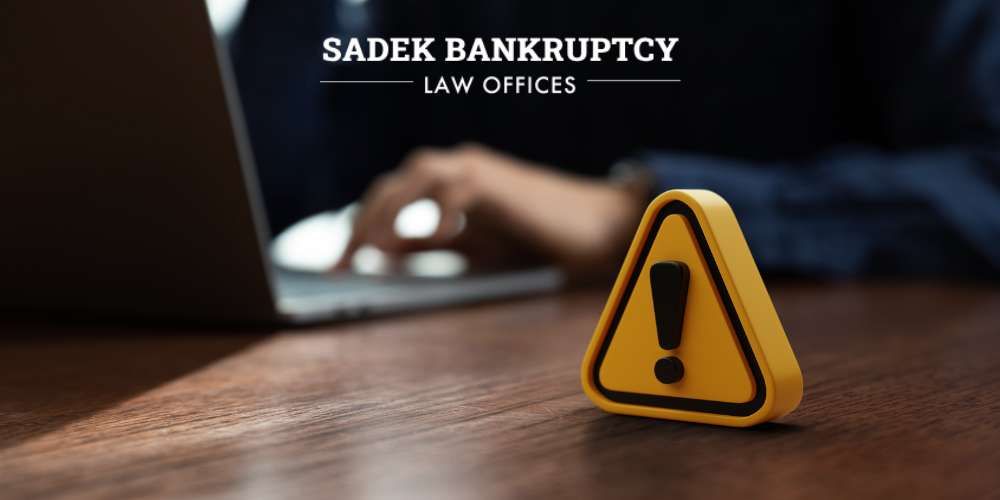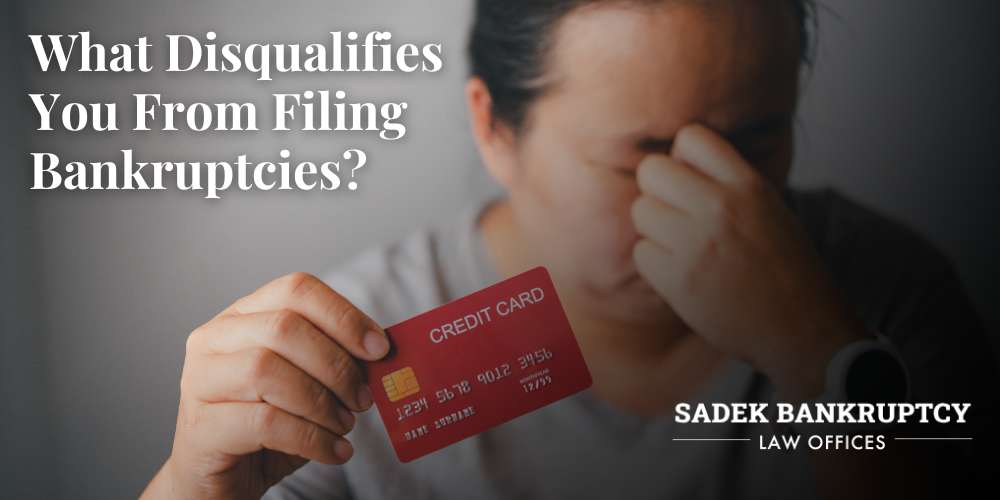Table of Contents
Filing for bankruptcy can offer a fresh financial start for individuals facing overwhelming debt, but not everyone qualifies for this type of debt relief. Understanding what disqualifies you from filing bankruptcies is crucial when considering your options. Various factors, such as previous bankruptcy filings or exceeding income limits, can prevent you from obtaining the necessary debt relief.
At Sadek Bankruptcy Law Offices, we help clients throughout Pennsylvania and New Jersey determine their eligibility for bankruptcy. If you’re concerned about whether you qualify for bankruptcy, contact our law firm for a free consultation with a Philadelphia bankruptcy attorney to explore your options and take the first step toward a more secure financial future. For our Pennsylvania location, please call (215) 545-0008; for our New Jersey office, please call (856) 890-9003.
What Qualifies You For Bankruptcies?

While certain factors may disqualify someone from filing bankruptcy, many individuals still qualify for some form of relief through bankruptcy. Bankruptcy laws are designed to offer a fresh start to those burdened by overwhelming debt, but qualification depends on a variety of elements, such as the type of bankruptcy you choose to file, your income level, and your ability to meet certain legal requirements.
Chapter 7 Qualifications
To qualify for Chapter 7 bankruptcy, your financial situation must meet certain criteria. First, you must pass the means test, which evaluates your income level compared to the median income for households in your state. If your income is below the state’s median, you are likely eligible for Chapter 7. Additionally, you cannot have had a recent bankruptcy discharge or a dismissed bankruptcy case under certain circumstances.
A Chapter 7 bankruptcy is ideal for those with significant unsecured debts, like credit card balances or medical bills, and who lack the disposable income to pay creditors.
Chapter 13 Qualifications
For individuals who do not qualify for Chapter 7 or prefer to keep their assets, Chapter 13 bankruptcy may be a better option. This type of bankruptcy petition involves a debt repayment plan and allows you to pay back your debts over a three-to-five-year period.
To qualify for a Chapter 13 bankruptcy, your secured debts and unsecured debts must fall within specific limits set by federal bankruptcy laws. Also, you must have a steady source of income to make the required monthly payments to your creditors. If your income exceeds the threshold for a Chapter 7 bankruptcy, Chapter 13 bankruptcy provides a way to reorganize your debt and keep your property while working toward financial stability.
What Can You Not Do After Filing Bankruptcies?
While filing for bankruptcy can provide much-needed relief from debt, there are certain financial actions you may be restricted from doing after your bankruptcy case is finalized. One significant limitation is the impact on your credit report. A bankruptcy filing can remain on your report for up to ten years, making it difficult to obtain new lines of credit, secure a mortgage, or qualify for certain loans. Additionally, after bankruptcy, you are not allowed to incur new debts without first informing the bankruptcy court and, in some cases, obtaining approval from your bankruptcy trustee.
Furthermore, you cannot file for another bankruptcy discharge for a certain period after your previous discharge. For example, if you received a discharge under Chapter 7 bankruptcy, you must wait eight years before filing for another Chapter 7 bankruptcy case. If you’ve filed for Chapter 13 bankruptcy, a two-year waiting period applies before seeking a new Chapter 13 bankruptcy discharge. These limitations ensure that bankruptcy is a genuine fresh start rather than a repeated financial strategy.
What Factors Can Disqualify You From Filing Bankruptcy?

Several factors can prevent you from successfully filing for bankruptcy or having your debt discharged. These disqualifying factors range from recent bankruptcy filings to actions taken before or during your bankruptcy case. Whether it’s your financial history, certain legal infractions, or your cooperation with the United States Courts, these elements can significantly impact your ability to file bankruptcy and obtain bankruptcy relief. In the following sections, we’ll explore what disqualifies you from filing for bankruptcy.
Having a Bankruptcy Case Recently Dismissed by the Bankruptcy Court
If you’ve had a bankruptcy case recently dismissed by the court, this often disqualifies you from filing bankruptcy for a certain period of time. Dismissals can occur for several reasons, such as failure to meet deadlines, not attending required hearings, or failing to comply with court orders. Depending on the reason for your dismissal, you may have to wait 180 days or longer before filing bankruptcy again.
Bankruptcy Fraud
Attempting to commit bankruptcy fraud is a serious offense that can permanently disqualify you from filing bankruptcy. Fraud can include hiding assets, intentionally lying on your bankruptcy petition, or transferring property to friends or family members to keep it from creditors. The bankruptcy trustee and the court thoroughly review your financial disclosures, and any indication of fraudulent behavior could result in criminal charges or dismissal of your case. The bankruptcy system is designed to provide relief to honest debtors, so it’s vital to be transparent throughout the process.
Having a Recent Bankruptcy Filing Discharge
If you’ve received a bankruptcy discharge from a recent case, you may not be eligible to file for bankruptcy again for a set period of time. For example, if you have received a discharge under Chapter 7 bankruptcy in the past eight years, you are not eligible to file for another Chapter 7 bankruptcy. Similarly, if you’ve filed for Chapter 13 bankruptcy, you must wait at least two years before pursuing another discharge.
Having Debts That Don’t Qualify for Bankruptcy
Not all debts can be discharged through filing for bankruptcy, and having debts that fall outside of bankruptcy eligibility may disqualify you from obtaining a full discharge. Unsecured debts, such as credit card debt and medical bills, are typically eligible for discharge, but certain debts like student loan debts, child support, and tax debts may not be wiped out.
Student Loan Debts
In most cases, student loan debts cannot be discharged in bankruptcy. However, if you can prove undue hardship under certain circumstances, your student loans may qualify for bankruptcy relief. An experienced bankruptcy attorney can help you explore whether your student loans may be eligible for discharge.
Child Support and Alimony Payments
Child support and alimony payments are considered non-dischargeable debts. This means that even if you file for bankruptcy, you will still be required to make these payments. The bankruptcy court prioritizes the welfare of dependents, ensuring that these obligations are met despite your financial situation.
Certain Tax Debts
Most tax debts are also non-dischargeable in bankruptcy. However, some older tax debts may qualify for relief under specific circumstances. Consulting with a bankruptcy attorney will help you understand which tax obligations may be eligible for discharge and which will remain after your bankruptcy case is complete.
Not Cooperating with the Bankruptcy Court
Your level of cooperation with the bankruptcy court can also affect your eligibility. Failing to comply with court orders, such as not providing necessary documentation, not attending hearings, or not completing required credit counseling, can result in a bankruptcy case dismissal. Lack of cooperation can also disqualify you from obtaining a debt discharge. Full compliance with court orders is essential to completing bankruptcy proceedings and receiving the necessary debt relief.
Making Too Much Income
Making too much income is one of the most common reasons individuals are disqualified from filing for Chapter 7 bankruptcy. If your monthly income exceeds the state’s median income, you may not pass the means test, which is used to determine if you are eligible for Chapter 7. However, if you don’t qualify for Chapter 7 due to high income, you may still be able to file for Chapter 13 bankruptcy, which allows for a debt repayment plan.
How to Determine If Bankruptcy Is Right for You

Filing for bankruptcy is a significant decision that depends on your unique financial situation. If you’re struggling with overwhelming financial responsibilities, such as credit card balances, medical bills, or other unsecured debt, bankruptcy may offer the relief you need.
However, it’s important to consider all factors, such as your monthly income, assets, and the debts you owe, before deciding. In the next sections, we’ll guide you through important steps, including attending credit counseling and seeking advice from a skilled bankruptcy attorney to help you make an informed choice about whether bankruptcy is the best solution for your financial challenges.
Consider Credit Counseling
Before filing for bankruptcy, you are required by law to attend credit counseling with an approved credit counseling agency. This session helps you evaluate your financial situation and explore possible alternatives to bankruptcy, such as debt management or debt repayment plans.
Credit counseling is valuable for assessing whether you can manage your debts without bankruptcy. Even if you decide to file for bankruptcy, the insights gained from credit counseling will help you better understand your options and make informed decisions about your financial future.
Contact an Experienced Bankruptcy Attorney
If you’re unsure whether bankruptcy is right for you, speaking with an experienced bankruptcy attorney is one of the most important steps. A knowledgeable attorney, like Brad Sadek from the Sadek Bankruptcy Law Offices, can help you understand the bankruptcy system, explain your options, and determine which type of bankruptcy may be appropriate for your situation. They can also guide you through the bankruptcy court process, ensuring that your case is handled correctly from start to finish.
Call Sadek Bankruptcy Law Offices in Pennsylvania and New Jersey Today
If you’re struggling with debt and unsure whether bankruptcy is the right solution for you, don’t wait any longer to get the help you need. For Pennsylvania residents looking for debt relief, call (215) 545-0008 to schedule your free consultation. If you’re in New Jersey, call (856) 890-9003 to schedule a bankruptcy consultation.





